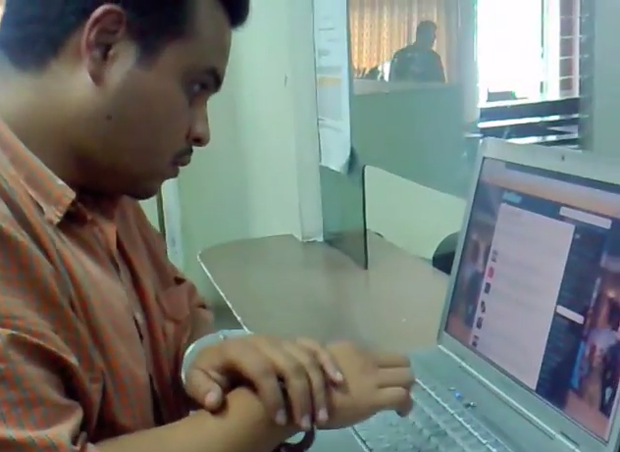15 Feb 2017 | Magazine, News, Uzbekistan
[vc_row][vc_column][vc_column_text]
Writing for Index on Censorship magazine’s autumn 2015 issue, writer Mamadali Makhmudov explored how his life had been upended by censorship in his native Uzbekistan. Arrested twice and imprisoned for 14 years, he was released in 2013 after an international outcry. He continues to be blacklisted and his works are silenced. Now, after the death of his wife, with his health failing, Makhmudov writes to bring us up to date on the frozen situation for freedom of expression for him and his country.
[/vc_column_text][vc_column_text]
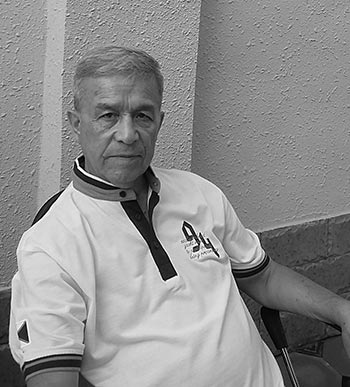
Mamadali Makhmudov
In 1943, my father Mahmud Ahmad-oghli, before he left for Great Patriotic War, said the following words to my mother, Saodat Izbosar-qizi: “Take care of my son. I will go to fight against Russian invaders on the German side…” I was a little baby then. But on my passport my age was written incorrectly: December 12, 1940. Place of birth: Boghdon village in Forish District (this name given by Tamerlane was actually named after Paris). The village I was born is situated at the foot of Nurota Mountains.
My father was a mountain-bek. Russian invaders hanged my grandfather Ahmad Aksakal in Narvon village in 1936. This is the detailed story: During its invasion of Boghdon, the wild enemy killed men, raped women, and pulled babies out of women’s wombs. That time, Ahmad Aksakal, together with his supporters, got ready to fight at Otuchganqoya rock. Using a trick, he brought the enemy (400 Russians) to the ambush at the dark ravine and suddenly attacked them, killing part of the enemy. He took 300 hundred Russians as hostages. My grandfather was so furious that he made the enemy to crack each other’s genital organs with stone. He burned them in front of the people, saying they are “unclean blood”. Now, there are three “Russian Hills” in Boghdon.
Though I know that in Judaism, Christianity and Islam, it’s not good to have bitter indignation at someone, I have a very strong desire for revenge. I finished an elementary school in Boghdon with such feelings. Later I studied at the Uchquloch gold mine (14 km far from our village) until the eighth grade.
It was my childhood dream to become a writer. I had a poor living condition, but I used to ask for books by helping people around me. Despite a hard life, I found time to read books. The works by European writers such as Shakespeare, Byron, Goethe, Hugo, Scott, translated from Russian into Uzbek, were my favorite books. May God forgive me, but I sometimes I had to deceive my mother and went to the graveyard, bush or ravines to read books till late evening.
In 1959-1961, I served in the army in Ukraine as a tank commander. In 1962, together with my crew, I went to Russia’s Efremov City in Tula region and worked at a chemistry plant construction. From there I was sent to chemical and automobile industry training in Voronezh for one year. Then I returned to Efremov and worked as mechanic’s assistant.
[/vc_column_text][vc_row_inner][vc_column_inner width=”1/4″][vc_icon icon_fontawesome=”fa fa-quote-left” color=”black” size=”lg” align=”right”][/vc_column_inner][vc_column_inner width=”3/4″][vc_column_text]
May God forgive me, but I sometimes I had to deceive my mother and went to the graveyard, bush or ravines to read books till late evening.
[/vc_column_text][/vc_column_inner][/vc_row_inner][vc_column_text]
In 1964, I came back to my homeland. I worked at Chrchiq Chemical Plant as mechanic for almost three years. Simultaneously, I finished evening courses for 10th and 11th grades. In 1966, I entered the Tashkent State University’s Faculty of Journalism. Because of a tough life, I had to study by correspondence. I worked for several newspapers in Guliston, Forish and Pakhtakor Districts as a proofreader and editor.
In 1968, the editor-in-chief of Saodat magazine, the poetess Zulfia, invited me to Tashkent and I have lived there since then.
When I was an eighth-grade schoolboy, I had a clear idea in my mind: “I will fight against Russian invaders not with a gun, but with a pen!” I think my mother, born in Kattaturk village in Samarkand, had encouraged me for such an idea. She once said to me: “Your grandpa Ahmad Aksakal often said the following: ‘Turkistan became a property for Russia. Day and night, they chased after our wealth, divided one nation into five different nations, and gave them five strange names and Cyrillic alphabet…’ You, sonny, should measure up to your grandpa!”
Based on my unchangeable faith and credo, I started writing short stories (Brook and Poplar, Horse, Hawthorn, etc.) to reveal the invader’s main purpose and ideology. They became sensation and were published in many newspapers and magazines, as well as in a collection called My Boghdon in 1971.
A power of liberty able to sweep Russian invaders from Central Asia came out that time, putting Moscow in anxiety and panic. Therefore, the Kremlin started its own propaganda against it. The propaganda was full of lie and slander (whoever believes Russia and China will never be able to correct that mistake). Russia called the freedom seekers “bosmachi” and tried to quickly get rid of them. To stand for it, I wrote my novel called Foggy Days (The Wolf of Boghdon), which also was warmly received by wide public.
Before my work appeared publicly, the USSR falsely described in historical books that “Russia annexed Central Asia.” I wrote it in my novel called Immortal Rocks, published in Sharq Yulduzi magazine in 1981. I wrote that Russia invaded Turkestan in exchange for the blood of millions of people.
For this work, I was dismissed from my work at the Writers’ Union. They took away all copies of the magazine. And I was in the black list of KGB for a long time. If Mr. Sharof Rashidov did not help me through Brezhnev, I would never come out of the prison.
Later, the novel was published in Germany, Turkey and France. I worked as the Secretary of the Writers’ Union and Chairman of Cultural Foundation. My friends know me as a person who fought for liberty.
When dependent nations gained independence thanks to Gorbachyov, a Communist, pro-Russian, ignorant and dictator became our ruler. He (Karimov) left a country full of corruption, with poor economy, agriculture, industry. He turned Uzbekistan into a big prison. He arrested freedom lovers and honest business people. Ethical norms were completely violated in the country. Eight million people left the country because of oppression, hunger and persecution. On fabricated charges (they put heroin, leaflets in my workplace and house) I was sentenced to 17 years in prison for allegedly being a member of Erk Party. I wrote several novels and short stories in the prison, but they took my work away. I hardly was able to get some parts of my novels such as Oynur, Oq Gul, and Bo’z Bo’ri. In 2013, when I was released with the help of US Secretary of State Hillary Clinton and European humanitarian organizations, I rewrote those books.
Oynur and Oq Gul are about that black history of the USSR and KGB. Bo’z Bo’ri is about the Arab invasion of Turon, their ruthless attacks, destructions of intelligentsia and other oppression. It’s about Muqanna, who bravely fought against those invaders. These books, along with my other articles and essays, are published on websites based in Europe, Canada and the United States.
I lost my health in prison, where hundreds of people die. I have had three heart attacks. I have ulcer in my stomach and my eyes have some other problems (cataract). I have six stones in my kidney. In short, I am in a poor health condition.
First of all, I need to have a stimulator installed in my heart. But I have no money for that, since we barely survive. Within 17 years, my family has been in debt. Despite working for state organisations for 40 years I receive a pension of just 179,000 UZS. And I even had to struggle for that for seven months. I don’t have enough means to buy medicine either. My books are not published in my own country. I am a banned author and I am always under surveillance.
When I was released, some humanitarian organizations in Europe and U.S., PEN Club and my friends supported me and we could get rid of 70% of our debt. Recently, my spouse Gulsara Mahmud died of heart attack. We are again in debt now.
Life is difficult. Nevertheless, I am writing the truth, only truth.
[/vc_column_text][/vc_column][/vc_row]
14 Apr 2016 | Asia and Pacific, Burma, China, Eritrea, Europe and Central Asia, Iran, Middle East and North Africa, mobile, News, North Korea, Saudi Arabia, Sudan, Turkmenistan, Uzbekistan
[vc_row][vc_column][vc_column_text]
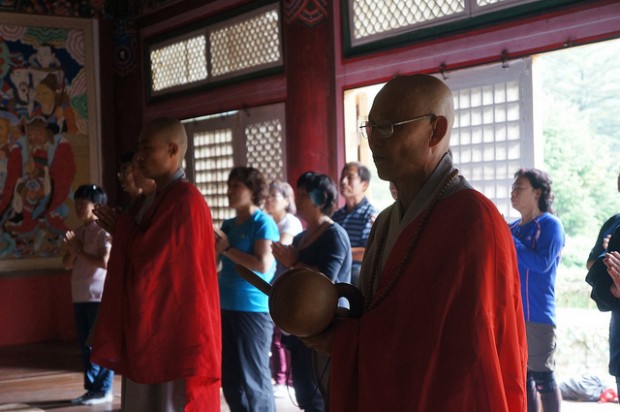
Pohyon Temple in the Myohyang mountains, once a national center for Korean Buddhism. Credit: Uri Tours / Flickr
After the United States Commission on International Religious Freedom, an independent organisation created by the US Congress to evaluate religious freedom conditions around the world, released its 2015 report, it became clear that an insufficient amount of progress had been made since Index on Censorship last reported on the issue.
Here’s a roundup of some the most appalling religious freedom violations from across the globe.
Burma
Bigotry and intolerance continue to scorch the lives of religious and ethnic minorities in Burma, particularly Rohingya Muslims. The Burmese government demonstrated little effort toward intervening or properly investigating claims of abuse, including those carried out by religious figures in the Buddhist community. As internet availability spread throughout the country, social media played a role in promoting a platform of hate and proposed violence against minority populations. Rohingya Muslims in the country face a unique level of discrimination and persecution. The government denies them citizenship and the right to identify as Rohingya. Additionally, four discriminatory race and religion bills could further the prejudices affecting religious minorities.
North Korea
North Korea is a nation where genuine freedom of religion or belief is non-existent; it remains one of the most oppressive regimes and worst violators of human rights. Punishment comes to those who pose difficult questions while the government maintains its control through a constant threat of imprisonment, torture and even death for those who break the law regarding religion. Estimates suggest up to 200,000 North Koreans are currently suffering in labor camps, tens of thousands of whom are there for practicing heir faith. In February 2014, the Commission of Inquiry on Human Rights in the Democratic People’s Republic of Korea released its report documenting the systematic, severe violations of human rights in the country. It found “an almost complete denial of the right to freedom of thought, conscience”.
Saudi Arabia
Officially an Islamic state with eight to ten million expatriate workers of different faiths, Saudi Arabia continues to restrict most forms of public religious expression inconsistent with its interpretation of Sunni Islam. The government continues to use criminal charges of blasphemy to suppress any dialogue between dissenting viewpoints, with a new law helping drive home the goal of silence. The Penal Law for Crimes of Terrorism and its Financing criminalises virtually all forms of peaceful dissent and free expression, including criticising the government’s view of Islam. Lastly, authorities continue to discriminate grossly against dissident clerics and members of the Shia community.
Sudan
The Sudanese government continues to engage in massive violations of freedom of religion, due to president Omar al-Bashir’s policies of Islamisation and restrictive interpretation of sharia law. Despite 97% of the population being Muslim, there is a wide range of other religions practiced. The country’s turmoil from religious persecution rests on the 1991 Criminal Code, the 1991 Personal Status Law of Muslims, and state-level “public order” laws, which have restricted freedom for all Sudanese. The laws – which contradict the country’s constitutional and international commitments to human rights and freedom of religion – allow death sentences for apostasy, stoning for adultery, cross-amputations for theft, prison sentences for blasphemy and floggings for undefined “offences of honor, reputation and public morality”. Since 2011, more than 170 people have been arrested and charged with apostasy.
Article continues below
[/vc_column_text][/vc_column][/vc_row][vc_row][vc_column][vc_custom_heading text=”Join the Index mailing list and get an exclusive gift” font_container=”tag:p|font_size:28|text_align:left” use_theme_fonts=”yes”][vc_separator color=”black”][/vc_column][/vc_row][vc_row][vc_column width=”1/2″][vc_column_text]
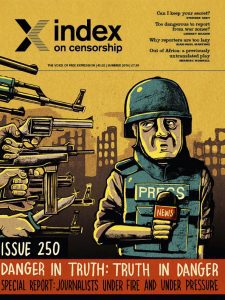
Index on Censorship’s summer magazine 2016
We’ll send you our weekly emails and periodic updates on our events. We won’t share your personal information with anyone outside Index.
You’ll also get access to an exclusive collection of articles from our landmark 250th issue of Index on Censorship magazine exploring journalists under fire and under pressure. Your downloadable PDF will include reports from Lindsey Hilsum, Laura Silvia Battaglia and Hazza Al-Adnan.[/vc_column_text][/vc_column][vc_column width=”1/2″][gravityform id=”20″ title=”false” description=”false” ajax=”false”][/vc_column][/vc_row][vc_row][vc_column][vc_separator color=”black”][/vc_column][/vc_row][vc_row][vc_column][vc_column_text]Uzbekistan
In Uzbekistan, the government imprisons individuals for not conforming to officially prescribed practices or whom it claims are extremist, including as many as 12,000 Muslims. A highly restrictive religion law is imposed, the 1998 Law on Freedom of Consciences and Religious Organisations, which severely limits the rights of all religious groups and facilitates Uzbek government control over religious activity. Many who don’t fit into the framework of officially approved practices are regularly repressed. Additionally, the government has continued a campaign against independent Muslims, targeting those linked to the May 2005 protests in Andijan; 231 are still imprisoned in connection to the events, and ten have died. All the while, Uzbekistan has pressured countries to return Uzbek refugees who fled during the Andijan tragedy.
Turkmenistan
In an environment of nearly inescapable government information control, severe religion freedom breaches persist in Turkmenistan. Continuing police raids and harassment of registered and unregistered religious groups matched with laws and policies that violate international human rights norms has the nation as one of the year’s biggest offenders. With an estimated total population of 5.1 million, the US government projects that the country is 85% Sunni Muslim, 9% Russian Orthodox, and a 2% total that includes Jehovah’s Witnesses, Jews, and evangelical Christians. Despite Turkmenistan’s constitutionally guaranteed religious freedom and separation of religion from the state, the 2003 religion law negates these provisions while setting intrusive registration criteria for individuals. It also requires that the government is informed of all foreign financial support, forbids worship in private homes and places discriminatory restrictions on religious education.
China
While the Chinese constitution guarantees freedom of religion, this idea really only applies to “normal religions”, better known as the five state-sanctioned “patriotic religious associations” associated with Buddhism, Taoism, Islam, Catholicism and Protestantism. Even still, the government monitors religious activities unfairly, and there has been an increased religious persecution of Uighur Muslims in the name of fighting terrorism. All around repression in China worsened in 2014, including the governmental push for controlling Tibet, Xinjiang, and even Hong Kong, as well as controls on the internet, social media, human rights defenders, activists and journalists.
Eritrea
Ongoing religious freedom abuses have continued in Eritrea, including torture or ill-treatment of religious prisoners, random arrests without charges and banning’s on public religious activities. The situation is especially serious for Evangelical and Pentecostal Christians and Jehovah’s Witnesses, and the government suppresses Muslim religious activities and those opposed to the government-appointed head of the community. In 2002, the government increased its control over religion by imposing a registration requirement on all religious groups other than the Coptic Orthodox Church of Eritrea, Sunni Islam, the Roman Catholic Church and the Evangelical Church of Eritrea. The requirements mandated that the non-preferred religious communities provide detailed information about their finances, membership, activities, and benefit to the country. Additionally, released religious prisoners have reported to USCIRF that they were confined in crowded conditions, and subjected to extreme temperature fluctuations. The government continued to arrest and detain followers of unregistered religious communities. Recent estimates suggest 1,200 to 3,000 people are imprisoned on religious grounds in Eritrea, the majority of whom are Evangelical or Pentecostal Christians.
Iran
Poor religious freedom in Iran continued to worsen in 2014, particularly for minority groups like Bahá’ís, Christian converts, and Sunni Muslims. The government is still engaging in systematic violations, including prolonged detention, torture, and executions based on the religion of the accused. Despite Christians, Jews, and Zoroastrians being recognised as protected minorities, the government has consistently discriminated against its citizens on the basis of religion. Killings, arrests, and physical abuse of detainees have increased in recent years, including for religious minorities and Muslims who are perceived as threatening the government’s legitimacy.[/vc_column_text][/vc_column][/vc_row][vc_row][vc_column][vc_basic_grid post_type=”post” max_items=”12″ style=”load-more” items_per_page=”4″ element_width=”6″ grid_id=”vc_gid:1493906845781-a7b9ac80-f77d-2″ taxonomies=”1742″][/vc_column][/vc_row]
20 Jul 2015 | Magazine, mobile, Volume 44.02 Summer 2015
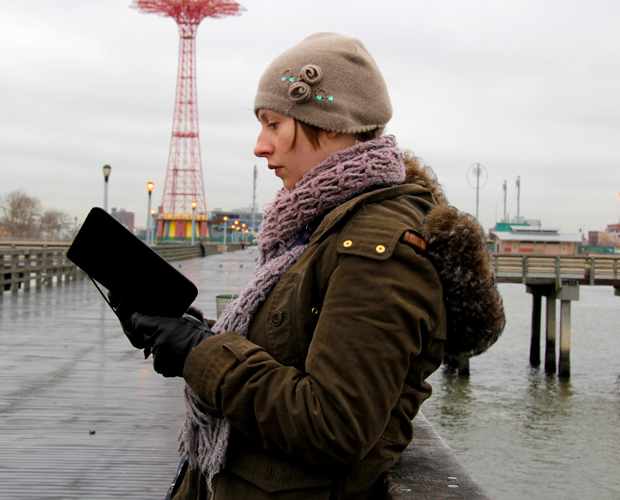
Ann Morgan’s self-imposed challenge to read 196 books in a year taught her much about the world of literary censorship. Credit: Steve Lennon
“For as long as people have been telling stories other people have been trying to shut them up,” writes Ann Morgan in Reading the World: Confessions of a Literary Explorer. The book, published earlier this year, charts her bid to read a book from each of the world’s 196 independent states. In the 365-day challenge, she faced constant barriers, from trying to find literature in places with almost no publishing industry, such as the Marshall Islands, to tracking down the works that the authorities have tried to hide.
Morgan found herself getting a crash course in world censorship. Two of the exiled writers she profiled have stories featured in the summer 2015 edition of Index on Censorship magazine: Ak Welsapar from Turkmenistan and Hamid Ismailov from Uzbekistan.
It was a chance tweet that Morgan spotted about Welsapar’s poetry that first led her to the as-yet-unpublished translation of his novel, The Tale of Aypi. She was soon struck by his use of Aesopian language and allegory to communicate subversive or challenging ideas, a literary tactic that Welsapar revealed was by no means accidental. Morgan told Index, “Towards the end of the Soviet era there was a relative loophole in one of the censor’s guidance documents that said that if there was an element of doubt in what was meant, the writer had the benefit of the doubt. This was a grey area that was quite freeing for Ak.” However, when the country declared independence in 1991, he found himself more censored than ever before, his works were banned and he was forced to flee to Sweden.
Ismailov faced a similar plight. After working on a series of articles and projects that criticised the Uzbek regime, his books – and even any mention of his name – were forbidden. He fled the country and ended up in the UK, working for the BBC. Morgan said: “When [Ismailov] was growing up, he always thought there was something wrong with the literature he was reading. All the positives he’d been bombarded with in Soviet literature didn’t make sense. He was seeing this gap between his reality and the reality of what he was reading.”
But of the 196 countries Morgan explored on a literary level, North Korea was the one that intrigued her the most. Keen to discover what – if anything – is read within its fiercely guarded border, she contacted a spokesman for the Democratic People’s Republic of Korea’s (DPRK) Committee for Cultural Relations for Foreign Countries (run by Alejandro Cao De Benós, the first and only foreigner to be allowed to work for the government in North Korea) and, after much persistence, was eventually sent a manuscript of My Life and Faith, the memoir of jailed North Korean war correspondent Ri In Mo. Mo was imprisoned for 40 years in South Korea in 1950, after being arrested for fighting as a guerrilla during the Korean War. Although his autobiography is primarily used as propaganda, Morgan found his work far less two-dimensional than she had expected; it included thought-provoking passages on how Mo engaged with the South Korean media after his release and how his words were altered by journalists to make him sound “more North Korean”.
Morgan feels her interactions with the DPRK Committee and reading the corresponding work taught her much about our refusal in the west to engage with abhorrent ideas: “I got reactions from people saying you shouldn’t read anything from there [North Korea], but to me this was still censorship, it was quite sinister. How are you to have a dialogue and move forwards if you are banishing them from the realm of the human and not allowing for any common ground?”
So does she believe books such as hers can help bring people’s attention worldwide to the issues surrounding literary censorship and further publicise these semi-forgotten works? “Hopefully, the project has brought attention to the works of a number of those writers who I encountered, and the works of many other writers out there who I didn’t read directly. I hope it encourages readers generally to look further and I hope in the long run it will bring more opportunities for other writers.”
You can read short stories by Ak Welsapar and Hamid Ismailov in the summer 2015 issue of Index on Censorship magazine. Ann Morgan’s book, Reading the World: Confessions of a Literary Explorer, was published in the UK by Harville Sacker in January 2015. Her blog is A year of reading the world.
17 Jun 2015 | Azerbaijan News, mobile, News
Governments don’t really like coming across as authoritarian. They may do very authoritarian things, like lock up journalists and activists and human rights lawyers and pro democracy campaigners, but they’d rather these people didn’t talk about it. They like to present themselves as nice and human rights-respecting; like free speech and rule of law is something their countries have plenty of. That’s why they’re so keen to stress that when they do lock up journalists and activists and human rights lawyers and pro-democracy campaigners, it’s not because they’re journalists and activists and human rights lawyers and pro-democracy campaigners. No, no: they’re criminals you see, who, by some strange coincidence, all just happen to be journalists and activists and human rights lawyers and pro-democracy campaigners. Just look at the definitely-not-free-speech-related charges they face.
1) Azerbaijan: “incitement to suicide”

Khadija Ismayilova is one of the government critics jailed ahead of the European Games.
Azerbaijani investigative journalist Khadija Ismayilova was arrested in December for inciting suicide in a former colleague — who has since told media he was pressured by authorities into making the accusation. She is now awaiting trial for “tax evasion” and “abuse of power” among other things. These new charges have, incidentally, also been slapped on a number of other Azerbaijani human rights activists in recent months.
2) Belarus: participation in “mass disturbance”
Belorussian journalist Irina Khalip was in 2011 given a two-year suspended sentence for participating in “mass disturbance” in the aftermath of disputed presidential elections that saw Alexander Lukashenko win a fourth term in office.
3) China: “inciting subversion of state power”
Chinese dissident Zhu Yufu in 2012 faced charges of “inciting subversion of state power” over his poem “It’s time” which urged people to defend their freedoms.
4) Angola: “malicious prosecution”
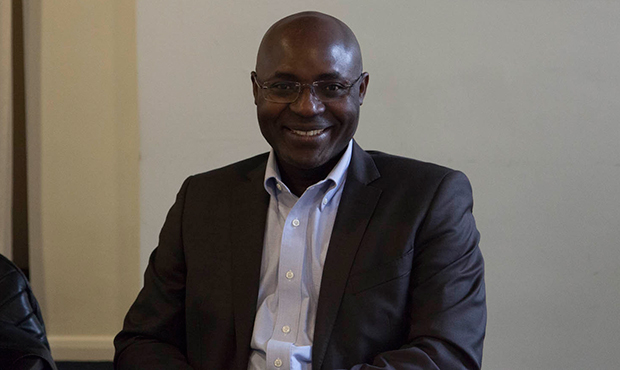
Journalist and human rights activist Rafael Marques de Morais (Photo: Sean Gallagher/Index on Censorship)
Rafael Marques de Morais, an Angolan investigative journalist and campaigner, has for months been locked in a legal battle with a group of generals who he holds the generals morally responsible for human rights abuses he uncovered within the country’s diamond trade. For this they filed a series of libel suits against him. In May, it looked like the parties had come to an agreement whereby the charges would be dismissed, only for the case against Marques to unexpectedly continue — with charges including “malicious prosecution”.
5) Kuwait: “insulting the prince and his powers”
Kuwaiti blogger Lawrence al-Rashidi was in 2012 sentenced to ten years in prison and fined for “insulting the prince and his powers” in poems posted to YouTube. The year before he had been accused of “spreading false news and rumours about the situation in the country” and “calling on tribes to confront the ruling regime, and bring down its transgressions”.
6) Bahrain: “misusing social media

Nabeel Rajab during a protest in London in September (Photo: Milana Knezevic)
In January nine people in Bahrain were arrested for “misusing social media”, a charge punishable by a fine or up to two years in prison. This comes in addition to the imprisonment of Nabeel Rajab, one of country’s leading human rights defenders, in connection to a tweet.
7) Saudi Arabia: “calling upon society to disobey by describing society as masculine” and “using sarcasm while mentioning religious texts and religious scholars”
In late 2014, Saudi women’s rights activist Souad Al-Shammari was arrested during an interrogation over some of her tweets, on charges including “calling upon society to disobey by describing society as masculine” and “using sarcasm while mentioning religious texts and religious scholars”.
8) Guatemala: causing “financial panic”
Jean Anleau was arrested in 2009 for causing “financial panic” by tweeting that Guatemalans should fight corruption by withdrawing their money from banks.
9) Swaziland: “scandalising the judiciary”
Swazi Human rights lawyer Thulani Maseko and journalist and editor Bheki Makhubu in 2014 faced charges of “scandalising the judiciary”. This was based on two articles by Maseko and Makhubu criticising corruption and the lack of impartiality in the country’s judicial system.
10) Uzbekistan: “damaging the country’s image”
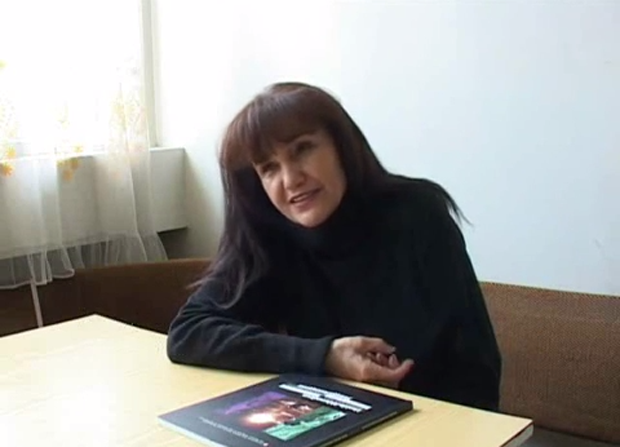
Umida Akhmedova (Image: Uznewsnet/YouTube)
Uzbek photographer Umida Akhmedova, whose work has been published in The New York Times and Wall Street Journal, was in 2009 charged with “damaging the country’s image” over photographs depicting life in rural Uzbekistan.
11) Sudan: “waging war against the state”
Al-Haj Ali Warrag, a leading Sudanese journalist and opposition party member, was in 2010 charged with “waging war against the state”. This came after an opinion piece where he advocated an election boycott.
12) Hong Kong: “nuisance crimes committed in a public place”
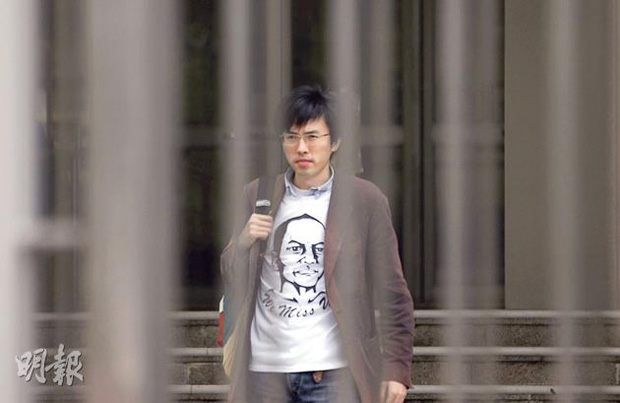
Avery Ng wearing the t-shirt he threw at Hu Jintao. Image from his Facebook page.
Avery Ng, an activist from Hong Kong, was in 2012 charged “with nuisance crimes committed in a public place” after throwing a t-shirt featuring a drawing of the late Chinese dissident Li Wangyang at former Chinese president Hu Jintao during an official visit.
13) Morocco: compromising “the security and integrity of the nation and citizens”
Rachid Nini, a Moroccan newspaper editor, was in 2011 sentenced to a year in prison and a fine for compromising “the security and integrity of the nation and citizens”. A number of his editorials had attempted to expose corruption in the Moroccan government.
This article was originally posted on 17 June 2015 at indexoncensorship.org








